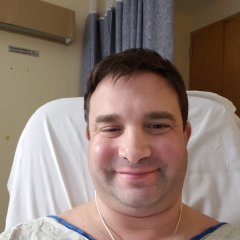Search the Community
Showing results for '"weight gain"'.
Found 15,849 results
-
That’s not too bad. I’m very anxious about weight gain. Glad you’re doing ok!
-
You feel guilty because society has stated Obesity is something we willfully do. And truly many of us have tried everything short of slitting our own throats as an intervention to slow or retard our weight gains. I have literally be obese since babyhood when my parents , Depression Survivors that they were, overfed me in the belief FAT BABIES ARE HEALTHY BABIES hate coming across that it is somebody else's fault, shifting the blame, but in MY case it is true. Weighed at 1 year the same weight as a healthy 2-and-half year old, and THAT AIN'T GOOD! Oh I am trying to debulk myself but it is not very easy. Lost 50 pounds since surgery but my floppy stretched out skin is going to just be, unless my reoccurent skin breakdowns buy me Plastic Surgery, and doubtful any would repair someone in their 70s. Look what happened to Joan Rivers, went in for something minor, ended up majorally DEAD.
-


Constipation & Trulance
FluffyChix replied to Andre Garcia's topic in General Weight Loss Surgery Discussions
I just started Linzess this morning. So how much weight gain did you experience? He told me yesterday it would not cause weight gain? *sobbing* Sorry about your thyroid going out. Do you think it could be coincidental? That you gained cuz of hypothyroid issues rather than the Linzess? I don't have any experience with the Trulance. Wish I could give feedback. -


Surgery In 2.5 Weeks and I Haven't Told Husband Yet...
Boldilocks posted a topic in PRE-Operation Weight Loss Surgery Q&A
Hey all - it's a while since I posted (and I was a newbie anyway so I hadn't posted much). I told myself it was because my surgery was still so far away that it was better to step away from the board and obsessing too much... but in reality it's because I'm anxious because I haven't told my husband and I don't know how to start. The surgery is Feb 5th! We have a few friends who have had the surgery and he is very negative and judgemental, critical and mocking. My main reason for getting it is PCOS - which causes weight gain as well as some other nasty side effects. My hormone levels are getting further and further away from where they should be, and the medications I was on are no longer working and are having a negative impact on my health. Honestly, the weight loss will be a bonus for me - it's resetting my hormones and becoming healthy again that I am most looking forward to. My BMI is "low" for this surgery at 36 - but I know that it will just get worse and worse so I should deal with it now while I am still relatively young. And he knows this - he has seen my struggle with awful hormonal conditions for 17 years. But all he ever says is that I need to work out more and eat better. A few things come into play in our relationship: 1. He is 25 years older than me (which I didn't find out about until after we were engaged - he lied about his age). 2. He is an alcoholic (which I didn;t find out about until after we were married. He is a binge drinker and so was able to stay sober for the months we were engaged). 3. I have an Irish accent that people here in the US gravitate to, and he gets very jealous. 4. He is not overweight as such, but has a belly from drinking and being middle-aged that he has been trying to lose since I met him. He yo-yos a lot, and goes on extreme fasts and workouts to lose it, then gains it all back when he goes on a drinking binge. He always talks about this magical day in the future when he has lost his gut, and it never comes. It will irritate him beyond belief that this day will come for me. These things make him very insecure, and while he gives me a hard time about my weight sometimes - I think he is very comfortable with me being fat as it means I am not going to leave him or be attractive to other men. He will be jealous of me. He might try to stop me getting the surgery. I'm not being fanciful - back in 2013 I was due to have a breast reduction. My boobs were massive, always had been even when I was 112 lbs. He supported my decision, wanted me to get the surgery... then he wen on a drinking binge the week before and I caught him trying to get my insurance cancelled so I couldn't have the op. When that didn't work he tried to call the hospital and cancel it - of course they wouldn't let him. When he sobered up he was mortified and bent over backwards to be supportive when I had the op - but it happened, and I am wary. To that end I am not telling him until after this Friday, as that is the end date for open enrollment on our insurance plan. I have gotten more savvy as time goes on! Please don't be lecturing me or telling me to leave. I know what the situation is, I know what I can deal with, and I have a plan. The only place I would want to go if I left would be home to Ireland, and that can't happen until my daughter is 16 - so I have 4.5 years to squirrel away money and position myself. I have a comfortable lifestyle, and it suits me to stay. I gave up everything to move here and be with him, and I figure I'm owed and would rather be comfortable until I can leave. If we divorced some other woman would move in and get what I'm owed - there is a shortage of men around here, esp men with good jobs. And honestly (don't judge me) - he is a 67 year old chronic alcoholic. He could pass away in the next 4.5 years and me and the kids would be pretty set. He doesn't bother me, we live pretty independently, there is no animosity, I have my own bedroom, and I pretty much do my own thing (like going home to Ireland for 6 weeks every summer). I have gone to all my weigh ins and pre-op appts without him even being in the slightest bit aware - that's how separate our lives tend to be. How do I start this conversation? He is smart and educated, but very judgemental. He is a therapist (haha, I know) who has had clients who have had the surgery and not done well. But they were a lot heavier than me, smokers and substance abusers, with severe mental health problems. I have read a lot and plan to make a note of all the benefits. I have some articles to show him - but I know he won't read them (he has a very short attention span and I've never seen him read a whole article never mind a book). I plan to ask him why he doesn't want me to have it - I know that "you could die" will be the only real thing he'll have to say - but I have a medical report showing that the mortality rate for sleeve surgery is 0.08%. He can't really say "because I'm jealous" as that isn't a valid argument. If he says it is the easy way out or the lazy way out I can cite facts to show him how it isn't - but even if it was... so what? So what if it was the easy way out it gets my health back on track and me feeling better? I mean, when I was having kids it was all epidural vs. med free and breast milk vs. formula. We all made our own choices, but in hindsight it didn't matter as long as the outcome was the same: a healthy baby. I'm trying to anticipate other things he might say, or stuff I should have prepped in advance. Everyone else I have told has been very supportive - my mum, two daughters, close friends. I know 4 people in my immediate circle who have had it and have asked a lot of questions. I guess my fear is that he will try to stop it somehow - I don't expect any support, but I don't want to blindside him by telling him afterwards. I don't plan on telling him my Dr's name or the hospital I'll be at, just in case. I'm very averse to confrontation and hate having hard conversations. I'm not scared of him - he isn't physically or emotionally threatening in any way, but I am scared to bring it up. Can't put my finger on why exactly. Thanks for listening to my ramble - I guess I'm just anxious, and I really could do without it because I am a natural worrier as it is! -


I'm getting RE-SLEEVED! Anyone else done this yet?
alchaley posted a topic in Gastric Sleeve Surgery Forums
I was originally sleeved in 2013 and was approved through a new insurance company to be sleeved AGAIN this year! Sadly my sleeve failed due to several major life occurrences and it stretched back out to the point that I've gained back half of the 100 pounds I had originally lost post op. Maybe I failed my sleeve, not the other way around but I'm not here to be judged. My dad died, I got divorced (and it was UGLY), fought for custody of my son (and won!), moved 3 times and then finally bought a house, was diagnosed with Bell's Palsy, got remarried and I had a heart attack all in the past 5 years!!! That being said, I'm ready to get resleeved but I've never met anyone who has done this. ANYONE??????? My only issue is the weight gain, I don't have GERD or any reflux issues or a hernia. I'm just fat again and can't lose it back. -


Pouch Rules for Dummies - Found this to be interesting
shoregirl75 posted a topic in POST-Operation Weight Loss Surgery Q&A
I copied this post from an old post I found on the site from 2013. What do you think? I kind of a long read, but I has a lot of good information I thought. I was most interested about the parts that talk about the importance of making the most in the first 6 months and not to take them for granted. I am 4 1/2 month out, so It has given me a renewed sense of urgency to make the most of my "honeymoon" period. As my weight loss starts to slow more, the more worried I get about actually meeting my goal. Pouch Rules for Dummies INTRODUCTION: A common misunderstanding of gastric bypass surgery is that the pouch causes weight loss because it is so small, the patient eats less. Although that is true for the first six months, that is not how it works. Some doctors have assumed that poor weight loss in some patients is because they aren’t really trying to lose weight. The truth is it may be because they haven’t learned how to get the satisfied feeling of being full to last long enough. HYPOTHESIS OF POUCH FUNCTION: We have four educated guesses as to how the pouch works: 1. Weight loss occurs by actually slightly stretching the pouch with food at each meal or; 2. Weight loss occurs by keeping the pouch tiny through never ever overstuffing or; 3. Weight loss occurs until the pouch gets worn out and regular eating begins or; 4 Weight loss occurs with education on the use of the pouch. PUBLISHED DATA: How does the pouch make you feel full? The nerves tell the brain the pouch is distended and that cuts off hunger with a feeling of fullness. What is the fate of the pouch? Does it enlarge? If it does, is it because the operation was bad, or the patient is overstuffing themselves, or does the pouch actually re-grow in a healing attempt to get back to normal? For ten years, I had patients eat until full with cottage cheese every three months, and report the amount of cottage cheese they were able to eat before feeling full. This gave me an idea of the size of their pouch at three month intervals. I found there was a regular growth in the amount of intake of every single pouch. The average date the pouch stopped growing was two years. After the second year, all pouches stopped growing. Most pouches ended at 6 oz., with some as large at 9-10 ozs. We then compared the weight loss of people with the known pouch size of each person, to see if the pouch size made a difference. In comparing the large pouches to the small pouches, THERE WAS NO DIFFERENCE IN PERCENTAGE OF WEIGHT LOSS AMONG THE PATIENTS. This important fact essentially shows that it is NOT the size of the pouch but how it is used that makes weight loss maintenance possible. OBSERVATIONAL BASED MEDICINE: The information here is taken from surgeon’s “observations” as opposed to “blind” or “double blind” studies, but it IS based on 33 years of physician observation. Due to lack of insurance coverage for WLS, what originally seemed like a serious lack of patients to observe, turned into an advantage as I was able to follow my patients closely. The following are what I found to effect how the pouch works: 1. Getting a sense of fullness is the basis of successful WLS. 2. Success requires that a small pouch is created with a small outlet. 3. Regular meals larger than 1 � cups will result in eventual weight gain. 4. Using the thick, hard to stretch part of the stomach in making the pouch is important. 5. By lightly stretching the pouch with each meal, the pouch send signals to the brain that you need no more food. 6. Maintaining that feeling of fullness requires keeping the pouch stretched for awhile. 7. Almost all patients always feel full 24/7 for the first months, then that feeling disappears. 8. Incredible hunger will develop if there is no food or drink for eight hours. 9. After 1 year, heavier food makes the feeling of fullness last longer. 10. By drinking Water as much as possible as fast as possible (“water loading”), the patient will get a feeling of fullness that lasts 15-25 minutes. 11. By eating “soft foods” patients will get hungry too soon and be hungry before their next meal, which can cause snacking, thus poor weight loss or weight gain. 12. The patients that follow “the rules of the pouch” lose their extra weight and keep it off. 13. The patients that lose too much weight can maintain their weight by doing the reverse of the “rules of the pouch.” HOW DO WE INTERPRET THESE OBSERVATIONS? POUCH SIZE: By following the “rules of the pouch”, it doesn’t matter what size the pouch ends up. The feeling of fullness with 1 � cups of food can be achieved. OUTLET SIZE: Regardless of the outlet size, liquidy foods empty faster than solid foods. High calorie liquids will create weight gain. EARLY PROFOUND SATIETY: Before six months, patients much sip water constantly to get in enough water each day, which causes them to always feel full. After six months, about 2/3 of the pouch has grown larger due to the natural healing process. At this time, the patient can drink 1 cup of water at a time. OPTIMUM MATURE POUCH: The pouch works best when the outlet is not too small or too large and the pouch itself holds about 1 � cups at a time. IDEAL MEAL PROCESS (rules of the pouch): 1. The patient must time meals five hours apart or the patient will get too hungry in between. 2. The patient needs to eat finely cut meat and raw or slightly cooked veggies with each meal. 3. The patient must eat the entire meal in 5-15 minutes. A 30-45 minute meal will cause failure. 4. No liquids for 1 � hours to 2 hours after each meal. 5. After 1 � to 2 hours, begin sipping water and over the next three hours slowly increase water intake. 6. 3 hours after last meal, begin drinking LOTS of water/fluids. 7. 15 minutes before the next meal, drink as much as possible as fast as possible. This is called “water loading.” IF YOU HAVEN’T BEEN DRINKING OVER THE LAST FEW HOURS, THIS ‘WATER LOADING’ WILL NOT WORK. 8. You can water load at any time 2-3 hours before your next meal if you get hungry, which will cause a strong feeling of fullness. THE MANAGEMENT OF PATIENT TEACHING AND TRAINING: You must provide information to the patient pre-operatively regarding the fact that the pouch is only a tool: a tool is something that is used to perform a task but is useless if left on a shelf unused. Practice working with a tool makes the tool more effective. NECESSITY FOR LONG TERM FOLLOW-UP: Trying to practice the “rules of the pouch” before six to 12 months is a waste. Learning how to delay hunger if the patient is never hungry just doesn’t work. The real work of learning the “rules of the pouch” begins after healing has caused hunger to return. PREVENTION OF VOMITING: Vomiting should be prevented as much as possible. Right after surgery, the patient should sip out of 1 oz cups and only 1/3 of that cup at a time until the patient learns the size of his/her pouch to avoid being sick. It is extremely difficult to learn to deal with a small pouch. For the first 6 months, the patient’s mouth will literally be bigger than his/her stomach, which does not exist in any living animal on earth. In the first six weeks the patient should slowly transfer from a liquid diet to a blenderized or soft food diet only, to reduce the chance of vomiting. Vomiting will occur only after eating of solid foods begins. Rice, Pasta, granola, etc. will swell in time and overload the pouch, which will cause vomiting. If the patient is having trouble with vomiting, he/she needs to get 1 oz cups and literally eat 1 oz of food at a time and wait a few minutes before eating another 1 oz of food. Stop when “comfortably satisfied,” until the patient learns the size of his/her pouch. SIX WEEKS After six weeks, the patient can move from soft foods to heavy solids. At this time, they should use three or more different types of foods at each sitting. Each bite should be no larger than the size of a pinkie fingernail bed. The patient should choose a different food with each bite to prevent the same solids from lumping together. No liquids 15 minutes before or 1 � hours after meals. REASSURANCE OF ADEQUATE NUTRITION By taking Vitamins everyday, the patient has no reason to worry about getting enough nutrition. Focus should be on Proteins and vegetables at each meal. MEAL SKIPPING Regardless of lack of hunger, patient should eat three meals a day. In the beginning, one half or more of each meal should be Protein, until the patient can eat at least two oz of protein at each meal. ARTIFICIAL SWEETENERS In our study, we noticed some patients had intense hunger cravings which stopped when they eliminated artificial sweeteners from their diets. AVOIDING ABSOLUTES Rules are made to be broken. No biggie if the patient drinks with one meal – as long as the patient knows he/she is breaking a rule and will get hungry early. Also if the patient pigs out at a party – that’s OK because before surgery, the patient would have pigged on 3000 to 5000 calories and with the pouch, the patient can only pig on 600-1000 calories max. The patient needs to just get back to the rules and not beat him/herself up. THREE MONTHS At three months, the patient needs to become aware of the calories per gram of different foods to be aware of “the cost” of each gram. (cheddar cheese is 16 cal/gram; Peanut Butter is 24 cals/gram). As soon as hunger returns between three to six months, begin water loading procedures. THREE PRINCIPLES FOR GAINING AND MAINTAINING SATIETY 1. Fill pouch full quickly at each meal. 2. Stay full by slowing the emptying of the pouch. (Eat solids. No liquids 15 minutes before and none until 1 � hours after the meal). A scientific test showed that a meal of egg/toast/milk had almost all emptied out of the pouch after 45 minutes. Without milk, just egg and toast, more than � of the meal still remained in the pouch after 1 � hours. 3. Protein, protein, protein. Three meals a day. No high calorie liquids. Fluid LOADING Fluid loading is drinking water/liquids as quickly as possible to fill the pouch which provides the feeling of fullness for about 15 to 25 minutes. The patient needs to gulp about 80% of his/her maximum amount of liquid in 15 to 30 SECONDS. Then just take swallows until fullness is reached. The patient will quickly learn his/her maximum tolerance, which is usually between 8-12 oz. Fluid loading works because the roux limb of the intestine swells up, contracting and backing up any future food to come into the pouch. The pouch is very sensitive to this and the feeling of fullness will last much longer than the reality of how long the pouch was actually full. Fluid load before each meal to prevent thirst after the meal as well as to create that feeling of fullness whenever suddenly hungry before meal time. POST PRANDIAL THIRST It is important that the patient be filled with water before his/her next meal as the meal will come with salt and will cause thirst afterwards. Being too thirsty, just like being too hungry will make a patient nauseous. While the pouch is still real small, it won’t make sense to the patient to do this because salt intake will be low, but it is a good habit to get into because it will make all the difference once the pouch begins to regrow. URGENCY The first six months is the fastest, easiest time to lose weight. By the end of the six months, 2/3 of the regrowth of the pouch will have been done. That means that each present day, after surgery you will be satisfied with less calories than you will the very next day. Another way to put it is that every day that you are healing, you will be able to eat more. So exercise as much as you can during that first six months as you will never be able to lose weight as fast as you can during this time. SIX MONTHS Around this time, our patients begin to get hungry between meals. THEY NEED TO BATTLE THE EXTRA SALT INTAKE WITH DRINKING LOTS OF FLUIDS IN THE TWO TO THREE HOURS BEFORE THEIR NEXT MEAL. Their pouch needs to be well watered before they do the last gulping of water as fast as possible to fill the pouch 15 minutes before they eat. INTAKE INFORMATION SHEET AS A TEACHING TOOL I have found that having the patients fill out a quiz every time they visit reminds them of the rules of the pouch and helps to get them “back on track.” Most patients have no problems with the rules, some patients really struggle to follow them and need a lot of support to “get it”, and a small percentage never quite understand these rules, even though they are quite intelligent people. HONEYMOON SYNDROME The lack of hunger and quick weight loss patients have in the first six months sometimes leads them to think they don’t need to exercise as much and can eat treats and extra calories as they still lose weight anyway. We call this the “honeymoon syndrome” and they need to be counseled that this is the only time they will lose this much weight this fast and this easy and not to waste it by losing less than they actually could. If the patient’s weight loss slows in the first six months, remind them of the rules of water intake and encourage them to increase their exercise and drink more water. You can compare their weight loss to a graph showing the average drop of weight if it will help them to get back on track. EXERCISE In addition to exercise helping to increase the weight loss, it is important for the patient to understand that exercise is a natural antidepressant and will help them from falling into a depression cycle. In addition, exercise jacks up their metabolic rate during a time when their metabolism after the shock of surgery tends to want to slow down. THE IDEAL MEAL FOR WEIGHT LOSS The ideal meal is one that is made up of the following: � of your meal to be low fat protein, � of your meal low starch vegetables and � of your meal solid fruits. This type of meal will stay in your pouch a long time and is good for your health. VOLUME VS. CALORIES The gastric bypass patient needs to be aware of the length of time it takes to digest different foods and to focus on those that take up the most space and take time to digest so as to stay in the pouch the longest, don’t worry about calories. This is the easiest way to “count your calories.” For example, a regular stomach person could gag down two whole sticks of butter at one sitting and be starved all day long, although they more than have enough calories for the day. But you take the same amount of calories in vegetables, and that same person simply would not be able to eat that much food at three sittings – it would stuff them way too much. ISSUES FOR LONG TERM WEIGHT MAINTENANCE Although everything stated in this report deals with the first year after surgery, it should be a lifestyle that will benefit the gastric bypass patient for years to come, and help keep the extra weight off. COUNTER-INTUITIVENESS OF FLUID MANAGEMENT I admit that avoiding fluids at meal time and then pushing hard to drink fluids between meals is against everything normal in nature and not a natural thing to be doing. Regardless of that fact, it is the best way to stay full the longest between meals and not accidentally create a “soup” in the stomach that is easily digested. SUPPORT GROUPS It is natural for quite a few people to use the rules of the pouch and then to tire of it and stop going by the rules. Others “get it” and adhere to the rules as a way of life to avoid ever regaining extra weight. Having a support group makes all the difference to help those that go astray to be reminded of the importance of the rules of the pouch and to get back on track and keep that extra weight off. Support groups create a “peer pressure” to stick to the rules that the staff at the physician’s office simply can’t create. TEETER TOTTER EFFECT Think of a teeter totter suspended in mid air in front of you. Now on the left end is exercise that you do and the right end is the foods that you eat. The more exercise you do on the left, the less you need to worry about the amount of foods you eat on the right. In exact reverse, the more you worry about the foods you eat and keep it healthy on the right, the less exercise you need on the left. Now if you don’t concern yourself with either side, the higher the teeter totter goes, which is your weight. The more you focus on one side or the other, or even both sides of the teeter totter, the lower it goes, and the less you weigh. TOO MUCH WEIGHT LOSS I have found that about 15% of the patients which exercise well and had between 100 to 150 lbs to lose, begin to lose way too much weight. I encourage them to keep up the exercise (which is great for their health) and to essentially “break the rules” of the pouch. Drink with meals so they can eat Snacks between without feeling full and increase their fat content as well take a longer time to eat at meals, thus taking in more calories. A small but significant amount of gastric bypass patients actually go underweight because they have experienced (as all of our patients have experienced) the ravenous hunger after being on a diet with an out of control appetite once the diet is broken. They are afraid of eating again. They don’t “get” that this situation is literally, physically different and that they can control their appetite this time by using the rules of the pouch to eliminate hunger. BARIATRIC MEDICINE A much more common problem is patients who after a year or two plateau at a level above their goal weight and don’t lose as much weight as they want. Be careful that they are not given the “regular” advice given to any average overweight individual. Several small meals or skipping a meal with a Liquid Protein substitute is not the way to go for gastric bypass patients. They must follow the rules, fill themselves quickly with hard to digest foods, water load between, increase their exercise and the weight should come off much easier than with regular people diets. SUMMARY 1. The patient needs to understand how the new pouch physically works. 2. The patient needs to be able to evaluate their use of the tool, compare it to the ideal and see where they need to make changes. 3. Instruct your patient in all ways (through their eyes with visual aids, ears with lectures and emotions with stories and feelings) not only on how but why they need to learn to use their pouch. The goal is for the patient to become an expert on how to use the pouch. EVALUATION FOR WEIGHT LOSS FAILURE The first thing that needs to be ruled out in patients who regain their weight is how the pouch is set up. 1. the staple line needs to be intact; 2. same with the outlet and; 3. the pouch is reasonably small. 1) Use thick barium to confirm the staple line is intact. If it isn’t, then the food will go into the large stomach, from there into the intestines and the patient will be hungry all the time. Check for a little ulcer at the staple line. A tiny ulcer may occur with no real opening at the line, which can be dealt with as you would any ulcer. Sometimes, though, the ulcer is there because of a break in the staple line. This will cause pain for the patient after the patient has eaten because the food rubs the little opening of the ulcer. If there is a tiny opening at the staple line, then a reoperation must be done to actually separate the pouch and the stomach completely and seal each shut. 2) If the outlet is smaller than 7-8 mill, the patient will have problems eating solid foods and will little by little begin eating only easy-to-digest foods, which we call “soft calorie syndrome.” This causes frequent hunger and grazing, which leads to weight regain. 3) To assess pouch volume, an upper GI doesn’t work as it is a liquid. The cottage cheese test is useful – eating as much cottage cheese as possible in five to 15 minutes to find out how much food the pouch will hold. It shouldn’t be able to hold more than 1 � cups in 5 – 15 minutes of quick eating. If everything is intact then there are four problems that it may be: 1) The patient has never been taught the rules; 2) The patient is depressed; 3) The patient has a loss of peer support and eventual forgetting of rules, or 4) The patient simply refuses to follow the rules. LACK OF TEACHING An excellent example is a female patient who is 62 years old. She had the operation when she was 47 years old. She had a total regain of her weight. She stated that she had not seen her surgeon after the six week follow up 15 years ago. She never knew of the rules of the pouch. She had initially lost 50 lbs and then with a commercial weight program lost another 40 lbs. After that, she yo-yoed up and down, each time gaining a little more back. She then developed a disease (with no connection to bariatric surgery) which weakened her muscles, at which time she gained all of her weight back. At the time she came to me, she was treated for her disease, which helped her to begin walking one mile per day. I checked her pouch with barium and the cottage cheese test which showed the pouch to be a small size and that there was no leakage. She was then given the rules of the pouch. She has begun an impressive and continuing weight loss, and is not focused on food as she was, and feeling the best she has felt since the first months after her operation 15 years ago. DEPRESSION Depression is a strong force for stopping weight loss or causing weight gain. A small number of patients, who do well at the beginning, disappear for awhile only to return having gained a lot of weight. It seems that they almost on purpose do exactly opposite of everything they have learned about their pouch: they graze during the day, drink high calorie beverages, drink with meals and stop exercising, even though they know exercise helps stop depression. A 46 year-old woman, one year out of her surgery had been doing fine when her life was turned upside down with divorce and severe teenager behavior problems. Her weight skyrocketed. Once she got her depression under control and began refocusing on the rules of the pouch, added a little exercise, the weight came off quickly. If your patient begins weight gain due to depression, get him/her into counseling quickly. Encourage your patient to refocus on the pouch rules and try to add a little exercise every day. Reassure your patient that he/she did not ruin the pouch, that it is still there, waiting to be used to help with weight control. When they are ready the pouch can be used once again to lose weight without being hungry. EROSION OF THE USE OF PRINCIPLES: Some patients who are compliant, who are not depressed and have intact pouches, will begin to gain weight. These patients are struggling with their weight, have usually stopped connecting with their support groups, and have begun living their “new” life surrounded by those who have not had bariatric surgery. Everything around them encourages them to live life “normal” like their new peers: they begin taking little sips with their meals, and eating quick and easy-to-eat foods. The patient will not usually call their physician’s office because they KNOW what they are doing is wrong and KNOW that they just need to get back on track. Even if you offer “refresher courses” for your patients on a yearly basis, they may not attend because they KNOW what the course is going to say, they know the rules and how they are breaking them. You need to identify these patients and somehow get them back into your office or back to interacting with their support group again. Once these patients return to their support group, and keep in contact with their WLS peers, it makes it much easier to return to the rules of the pouch and get their weight under control once again. TRUE NON-COMPLIANCE: The most difficult problem is a patient who is truly non-compliant. This patient usually leaves your care, complains that there is no ‘connection’ between your staff and themselves and that they were not given the time and attention they needed. Most of the time, it is depression underlying the non-compliance that causes this attitude. A truly non-compliant patient will usually end up with revisions and/or reversal of the surgery due to weight gain or complications. This patient is usually quite resistant to counseling. There is not a whole lot that can be done for these patients as they will find a reason to be unhappy with their situation. It is easier to identify these patients BEFORE surgery than to help them afterwards, although I really haven’t figured out how to do that yet… Besides having a psychological exam done before surgery, there is no real way to find them before surgery and I usually tend toward the side of offering patients the surgery with education in hopes they can live a good and healthy life. -


hiatal herniorrhaphy vs conversion to RNY gastric bypass
sleevedjohnson16 posted a topic in Gastric Sleeve Surgery Forums
Hey all, super new here ! I have been struggling with getting the help from google, or locals who have been sleeved, so I am looking to gather more information to help make the best decision... I was sleeved in June of 2016 - I started at 286lbs, 5ft 6 in tall. Fast forward to now, I am 140lbs, and a BMI in the low 20s. I am active, thin, little loose skin, and LOVING the new life I have been blessed with...for 99% of the time... The kicker is the GERD symptoms I have are out of this world. I was someone who had this pre-op, and had I known what I know now I would have never agreed to the sleeve vs bypass. I have been in the midst of a whirlwind of testing..first my NEW bariatric dr suggested perhaps I have a flare up of the H. Pylori I was known to have after the stomach contents were biopsied, so we started with a stool test for that, thinking we will start small. This came back negative, and I then went in for a barium swallow which showed from his report to me, a "Massive" hiatal hernia in which he defiantly was interested in repairing. Then, I went in for a CTA to look for SMA Syndrome, basically the superior mesenteric artery compressing the duodenum - this was negative. Now, I am waiting on the ph & manometer testing to determine if I am a candidate to just have the hernia repaired by normal forms...but, Here inlays the questions I have, and personal experience is worth every bit to me. IF you have a hernia now (and DID NOT) have one prior to VSG - its causing you so much discomfort that you can not sleep, eating and swallowing pills has become challenging and you basically just refuse it all...what decision do you make..is a hernia repair going to be enough to cure this without the possibility of it returning..OR do you go with the revision to bypass to FIX it once and for all ? My dr has given me a lot of literature to go over and read and things to think about. I just don't know which is best. He has agreed to do either of these to help, provided my esophagus is operating in proper order following the results of my ph probe. He has asked that I TRY to maintain this weight and not lose any more, I am at the bottom of the scale where I ever wanted to be, frequently falling into the high 130s . Other questions I have are - am I going to lose more weight if I am revised to RNYBP? Will I have an intolerance to foods with ANOTHER new tummy? Will I need an open repair to revise this? also, if I choose the hernia repair will I end up with tighter restriction again with them using part of the tiny tummy I have to cuff at the top to fix the hernia? Is mesh safe to repair a hiatal hernia these days should that be the "fix" ? Has ANYONE been through this situation with these quirks. I don't need revision due to weight gain, I am already pretty small for my height. I have been this weight for 15 months or more. Please help! any insight or personal experience either way would be amazing.-
- hiatial hernia
- vsg
-
(and 4 more)
Tagged with:
-


When did you really start to see results?
Frustr8 replied to Bypassgirl92's topic in POST-Operation Weight Loss Surgery Q&A
Yeah me( waving for attention) & I think I do have grounds to. 4 months, probably stalled because of higher calorie count of.my TPN, woke up this AM to phone alarm going off, I don't even use it, must have been one of Tomkitten's bright ideas. He's still asleep, it didn't wake HIM up. Upper right chest pain, high surface , over top of boob, now what could THAT be? Last time I drug me to the ER I was told it was atypical costochodritis but that was even left near the sternum and I got poo pooed, couldn't even have a cardiac event if I tried. Really this today feels more like a muscle pull. Not right area for my,ulcer pain, that is right subcostal classically. Well I do have an appointment with surgeon Tuesday morning, if no better suppose I could mention it to him, he'll probably say " Not My Problem" and of course it isn't, but it's more a bother than something that will kill me. But I am having a PLOM moment, stands for 0oor Little Old Me, but I'm sure once I see sunlight I'll get up and try facing this Monday Morn. The surgery did stop the perilous weight gain, I'm not gaining any more, actually at a mid point, down more 100 pounds from High Weight but 75- 80 pounds to goal, still on token liquids and TPN for nutrition and to maintain my life and let my beleagured GI system heal. But Marching forward to Good Health?, nope, Don't Think So! -
Perhaps this post will help someone who is seeking to do VSG or some form of WLS because I will be honest with you about my journey. It has been 8 months since I had VSG surgery and I have lost only 44 lbs. Up to a month ago I had lost 55 lbs but I have since gained 10 lbs. There are a couple reasons for my weight loss failure and I am just putting them down in writing not so much so that folks can be critical, but more for the folks out there considering this surgery or might just have had it. I have not been committed to the process of changing bad habits or incorporating exercise into my lifestyle. I must have thought that having VSG was going to magically take away my appetite and food cravings for bad food. Guess what? I was starving the day after surgery! My appetite really never left. So if I did not CHOOSE what to eat and what not to eat, you could pack in tons of calories even in small portions. To cut to the chase, VSG does not work if you are not disciplined with your food choices. That shouldn't be a huge revelation but I actually had a mindset that my stomach would be gone and I would not even want to eat anymore so all the weight would just melt away. It does not happen that way! I did not follow the instructions and guidelines post surgery about not eating and drinking at the same time. I had been told not to do it, I read that it would stretch your stomach pouch, but I still went ahead and did it. Guess what? My stomach has stretched and I can basically eat a small 'normal' size meal at only 7 months out when it should not be like that this early. Again, not being committed to the process I am a type II diabetic. The catch 22 is that taking insulin makes you GAIN weight. That is just the nature of insulin and the more insulin you have to take, the more you gain weight. The first 4 months after surgery I was taking hardly any insulin at all but as my stomach expanded and I was able to eat more I had to increase insulin intake. So as a diabetic I'm really supposed to be exercising to compensate for that but cant seem to get this life style discipline into my life. I have a tread mill in the spare room - what is wrong with me!!!! I am hoping that I can gather the motivation, the inspiration that inner push that I need to develop discipline in my life. i'm almost 50 years old and its really hard changing the way you have lived for so long but there are no short cuts, not even VSG 'saved' me. Sometimes I think the biggest problem and hinderance is just me because discipline does not depend on emotions - discipline is 'just do it' no matter if you 'feel' it or not...………..I NEED this, I need to get this translated from my head knowledge into practical living...….I'm rambling now I'm hoping my update in the next 3 months will be a very different one in a more successful direction
-


Support and honesty needed
Vizslamom replied to ShrinkingTN- hopefully's topic in Gastric Sleeve Surgery Forums
I struggled with hunger horribly once my lap band was removed. Tried all sorts of medical interventions because my husband was not on board with surgery. After 9 months and a 30 pound weight gain enough was enough. 5 months out from sleeve, 55 pounds down now. Still love to eat, but am so relieved I am satisfied with a smallish portion. -
I brought up my concern a few weeks back. I had just went below 170 at the time. Doctor wasn't overly concerned. Mention drinking a weight gain shake. He is supposed to call me after I notified his office yesterday what my weight had d5opped down too. Still waiting for that call.
-


How often do you get on the scale months out vs years out?
Healthy_life posted a topic in General Weight Loss Surgery Discussions
Can I have a moment of silence for my bathroom scale. Yesterday, my husband dropped my digital bathroom scale. The glass top shattered. I've had this scale since 2015. It's been by my side throughout the ups and downs of surgery. I have been in the habit of getting on the scale every day. I've tried to weigh myself every two weeks and found that weight gain sneaks up on me. Now that my scale is gone I'm torn. Is weighing every day healthy or unhealthy at this point? I'm putting it to the test and weighing myself less. I'm trying to trust myself. How often do you step on the scale months out vs years out? -


GASTRIC SLEEVE and HERBAL LIFE
batty_vsg replied to Emerito.h305's topic in Gastric Sleeve Surgery Forums
I feel like you are in a really good place right now because you've gotten past a really first important step - you know an issue that could be causing your weight gain! A glass a wine is not going to untie everything you've done, but if you're like me - some things are not acceptable in moderation and should just stay away from. You still are reaping the benefits of the decision you made, you still look really good! So, do what you can and manage the alcohol consumption. If you're still having issues, that can be dealt with too! -
#9 How I'm Keeping on plan: Some fear of weight gain keeps me on plan. I gain quickly and it's slow to come off. I log, exercise, keep motivational things on my fridge, set goals, and this challenge is helping. Thanks @GreenTealael Don't judge. Three months until Vegas. I'm going to see my sister in law on this vacation. At the beginning of my weight loss, she said to me " you know your just going to gain your weight back." 🙄 Anger is a great motivator to stay on plan. I hope to be in the low 130's for Mt Charleston.
-


Preop weight gain
Naughty Glitter Goddess replied to 2Bsmaller18's topic in Gastric Bypass Surgery Forums
I would be shocked if a weight gain of 2lb caused and issue with proceeding with surgery. I mean, I have some winter boots that weigh much more than that! I'm not sure about your surgeon's policies by at my office, generally, the insurance company would only decline to cover if you had a large weight loss with lifestyle changes and they determined it was no longer medically necessary. However, the policy for my surgeon, was that you needed to have a small weight loss, and no large gains in the 6 mo leading up to surgery to ensure you were willing to participate in making the changes to help surgery be successful. 2lbs would not have been a factor for either of those situations. Not sure about the cutoff weights, but one man in my group lost 70 lbs prior to surgery and his insurance still covered it. Another woman gained 20 lbs during the pre-op program but then lost 5 in the month before surgery - she still got to move forward as well. You can do this! And I don't think you need to take any extreme actions over the 2 lbs. Just work your plan consistently and you'll do well. Good practice for post op, too! We're all rooting for you! -
So due to the holidays I have gained 2 lbs. I have my final nut visit tomorrow. I plan to wear light weight clothing, plan to take an Epsom bath tonight and tomorrow am and only drink a half of a protein shake in the morning before the appt. I have been eating really clean (low sodium etc.) the past few days, drinking tons of water and limiting to 1100 calories so I am hoping the scale looks better tomorrow. So my question- does insurance look at the weight from the first and last doctor's appointment or the nutritionist? It is at 2 different offices and 2 different scales. My doctor appointment is next week and surely I can lose the 2 pounds by then and be less than my initial appointment. I can't delay either appointment due to insurance number of days requirement. Ugh!! I wish I would have been more mindful over the holidays.
-


It’s crazy the vast differences in plans.
Alpaca55 replied to Chuck Clasik's topic in Gastric Sleeve Surgery Forums
I went to see the dietician yesterday and now feel more irritated, confused, depressed and defeated... She said: DON'T weigh food! DON'T count protein or calories or carbs! She said I just have to use the 'bariatric plate'. I find this (attached) completely confusing as I could load up the plate to many different amounts of food and types of food so how was that helpful. She told me not to get so hung up. She personally doesn't have a weight issue (or perhaps she does have a thin issue!), she had no empathy and just sent me on my way making me feel I was making a mountain out of a molehill! I asked her about the wisdom of using sugar free options as I am very suspicious of them as there has been so much written about the negative effects of splenda, sucralose, aspartame, etc ... when I was on Atkins, I kept right away from anything sugar free. But, she said it was fine. I've been told by my surgeon that my weight loss is too slow and disappointing, but as I have Atrial Fibrillation, I have to take beta blockers that slow down the metabolism and cause weight gain. I'm trying to be really strict with my counting and she said it sounded like I was making the right choices. But, she said that she and the surgeon expected me to lose another 16lbs by the end of this month!! She said my food choices look good so I should stop worrying... Feeling exasperated and down-hearted. VSG - Bariatric Plate.pdf -
I had my operation on 12/17 and stalled this past week where I would lose a pound one day, then gain a half pound the next etc. I got on the scale yesterday and it dropped 2 pounds and today I lost another 1.5 pounds. Go figure??? Weight loss has never been linear for anyone (neither has weight gain). It's all about trends and, for once, it's finally "trending" in the right direction. Today is my first day back to work since the surgery and it's been very strange. It seems like everyone in my office knows, but they have been very supportive (at least as far as I can tell). Still, I am suffering from a little brain fog that I didn't notice since my brain power wasn't an issue when I wasn't in the office. It was nice being home and being able to focus 100% on recovery. Now, I am back in the real world and it's not all about me and my weight loss efforts anymore. Anyone else struggling to adjust to getting back to work and the "real world"?
-
When we are in the hospital for surgery, generally we can be administered antibiotics to prevent wound infection. This is not a bad thing. There are a lot of bad bacterial germs floating around in a hospital setting. Most surgical procedures do not require prophylactic or postoperative antibiotics. However, certain patient-related and procedure-related factors alter the risk/benefit ratio in favor of prophylactic use. Patient-related risk factors suggesting need for antibiotics include Certain valvular heart disorders Immunosuppression Procedures with higher risk involve areas where bacterial seeding is likely: Mouth GI tract Respiratory tract GU tract In so-called clean (likely to be sterile) procedures, prophylaxis generally is beneficial only when prosthetic material or devices are being inserted or when the consequence of infection is known to be serious (eg, mediastinitis after coronary artery bypass grafting). Choice of antibiotics is based on the Surgical Care Improvement Project (SCIP) guidelines (see Perioperative Management). There is strong evidence that standardizing antibiotic choices and adhering to SCIP protocols or another standardized and validated protocol reduce the risk of surgical infection. Some regions of the US that followed SCIP guidelines were able to decrease surgical site infections by 25% from 2006 to 2010. Drug choice is based on the drug's activity against the bacteria most likely to contaminate the wound during the specific procedure (see Table: Antibiotic Regimens for Certain Surgical Procedures). The antibiotic is given within 1 h before the surgical incision (2 h for vancomycin and fluoroquinolones). Antibiotics may be given orally or IV, depending on the procedure. For most cephalosporins, another dose is given if the procedure lasts > 4 h. For clean procedures, no additional doses are needed, but, for other cases, it is unclear whether additional doses are beneficial. Antibiotics are continued > 24 h postoperatively only when an active infection is detected during surgery; antibiotics are then considered treatment, not prophylaxis. The Center for Disease Control has published guidelines for prevention of surgical site infections that address topical and nondrug antiseptic measures (eg, bathing, sealants, irrigation, prophylaxis for prosthetic devices). Source: Prevention of Surgical Infections The antibiotics destroy not only the bad bacteria in the gut but also the good bacteria. Therefore I feel it is important to reestablish the good gut bacteria after surgery by using probiotics. I ran across an article this morning that discusses the relationship of gut bacteria and weight gain. While it has long been known that low dose antibiotics cause weight gain in animals, the mechanism by which they do this has been a mystery. Researchers are now beginning to zero in on the effect and their work may even shed light on the human obesity epidemic. Animals, like humans, have numerous bacterial species living in their gut. Believe it or not, there are more bacterial cells in our body than human cells. Of course, bacterial cells are much smaller than human cells. But their effect on our health may not be small. Some varieties of bacteria are more likely to cause the body’s immune system to swing into action, but usually different bacteria keep each other’s multiplication rate in check by competing for the same food supply. But if the bacterial balance is upset because an antibiotic reduces the numbers of one species more than others, an inflammatory response can occur. Such a response is linked with making our cells less sensitive to insulin. “Insulin resistance” means that glucose is less likely to be taken up by cells, and since it is the cell’s main source of energy, they crave an increased intake. This translates to a boost in appetite as the body strives to meet cellular needs. What all of this suggests is that some species of bugs in our intestine may contribute to weight gain more than others, and that these may become more prevalent when competitors are reduced by antibiotics. Of course, other factors may also play a role in altering the bacterial flora. The chlorination of drinking water as well as improved sanitation may influence both the type and the number of microbes that reside in our gut. Who knows, perhaps all that emphasis on getting rid of germs may be affecting our waistline. Is there any actual evidence for this postulated link between changes in gut bacteria and obesity? In one word, yes. When Martin Blaser, a microbiologist at New York university, fed infant mice doses of penicillin comparable to those given farm animals, he found that after 30 weeks these mice had put on 10-15% more weight than those not treated with the antibiotic. Furthermore, the mice that had been treated had a different microbial flora in their gut, with Lactobacillus, one of the “good” bacteria, having significantly decreased. When gut bacteria from these mice were introduced into mice had been bred in a totally sterile environment, and were therefore germ-free, they put on more weight than mice with the regular complement of microbes in their gut. While overconsumption of food is the crux of the obesity problem, one of the reasons why we eat too much, as we have now seen, may be due to the changes that have occurred in the microbial population of our gut. A study of ancient feces from caves, as well as from the intestinal tract of mummies, has revealed a microbial makeup that is quite different from that found in our guts today. Those ancient microbial populations are more similar to the ones found in chimps, gorillas and children in rural Africa than in the intestines of North Americans who are more likely to have been exposed to chlorinated water, antimicrobial cleaning agents and antibiotics. Maybe a partial answer to obesity is to repopulate our intestines with the bacteria found in ancient poop. Source: Bugs In Our Guts
- 1 reply
-
- weight loss
- antibiotics
-
(and 2 more)
Tagged with:
-


Has anyone ever had a sleeve revision?
need2bthin! replied to need2bthin!'s topic in Revision Weight Loss Surgery Forums (NEW!)
If you don't mind me asking what was the reason, weight gain? Also how do they perform it? Did insurance cover it? Thank you -


Weight Gain after Pregnancy, Stress over Sick Daughter - 5Yrs. Post Op
Danny Paul replied to msdrea24's topic in Tell Your Weight Loss Surgery Story
Depression and anxiety are two things that can not only derail our weight loss success but they also undermine our general health. Despite getting WLS and succeeding for a long time you are facing a health crisis due to your depression and anxiety. I have always been a person that family and friends come to for advice and comfort. When I experienced something in my life that caused me anxiety I had no one to turn to. That was until I met a 90 plus WW2 veteran when I was volunteering at a veterans event. What an amazing person he is. I am able to talk to him about my problems and he seems to always have the best advice or a perspective that I didn't see. By being able to talk honestly with someone and "lay bare my soul" I was able to begin the healing process. I suspect that you too need a person to talk to. Is there someone that you know who can offer you unfiltered advice? It's important not to bottle up your feelings and to let them out. Depression and anxiety are silent unlike a heart attack, they creep up on you without you knowing and then you're in their grasp. Fight back, find someone who will listen and offer advice and most of all a sympathetic ear. The one person that I thought would help was my therapist, unfortunately I see her for 45 minutes every two weeks and I needed more counseling than she could offer. Attack the depression and anxiety and you will overcome the weight gain. I wish you and your family the best. -
Recently I gained six pounds. I was sleeved 16 months ago. I have a threshold weight that I use as my weight barometer. Once I get to that weight I know I'm in the danger zone. For me the weight is 160lbs. I went to 162lbs. My first goal was to find out what to attribute the weight gain to. So, I poured over my food diaries and found that I was making fruit smoothies. It seems that the fruit smoothies caused the weight gain. I stopped the fruit smoothies and started on a plan to loose the weight. Since I don't go to the gym I needed to incorporate some form of physical activity into my day. I live in a high-rise building and decided to walk the 12 flights of stairs instead of taking the elevator. I also increased my water intake and cut out my after dinner snack. I'm glad to say that I lost seven pounds and I'm down to 155lbs. 20 years ago I lost close to 70lbs but I never set a threshold weight. So when I would gain six pounds it wasn't urgent for me to lose it. Subsequently those six pounds turned to 15 pounds then to 30 pounds until I regained the 70 pounds and then some. For me, I need to set a threshold weight so that I know I'm in danger.
-
I have seen several people mention gaining weight after 5yrs post-op. I too am starting to experience weight gain and no longer feel the restriction like I use to when I eat. Had anyone had the revision to help get back on track?
-


Weight Gain after Pregnancy, Stress over Sick Daughter - 5Yrs. Post Op
msdrea24 posted a topic in Tell Your Weight Loss Surgery Story
Hello, My name is Andrea from New Jersey. had my VSG done in September of 2012. At my largest, I was 250lbs. In less than a year post op, I went down to 165lbs. I felt that I looked good! I could fit into so many cute outfits without feeling ashamed of how I felt in my body. Health-wise, it was a bit more complicated. Between my “water-nausea”, not being able to drink and eat at the same time, needing to take vitamins everyday, feeling sick after enthusiastically eating my favorite foods, and then, of course getting gall stones and needing my gallbladder removed in 2013, my VSG came with a lot of mixed feelings. Nevertheless, I was happy to feel like I looked good and have the energy that came along with that. Fast forward to February of 2017, I find out I’m pregnant with my first child. At that point, I had been able to maintain a steady 165-170 lbs. At 36 weeks, I went into labor and subsequently had my daughter a month before her due date. On the day I gave birth, I weighed 200lbs. I thought it was normal. The few days following the birth of my baby girl, I actually went down to 180lbs. Not exactly where I wanted to be, but at the time I thought my body would go back to 165-170lbs. ....Boy was I wrong. My daughter was born in September of 2017. In the winter months, specifically January, February and March of 2018 my daughter was diagnosed with RSV, Influenza Type A, and Metapneumovirus, respectively. My husband and I spent many days in the hospital with her.... stressing, worrying, sad, not getting paid time off (in my case), and, of course.....eating. During this time is when I believe my body began to turn on me. Today, I weigh 209lbs. I went from a size 8 to a 14, I feel that I have less energy, and I know that I’m unhealthy. I seem to have regained an almost insatiable hunger fueled by my constant anxiety and stress. Not to say that I didn’t suffer from these things before, but honestly, I don’t know what has changed exactly that doesn’t allow my body to metabolize quicker and keep the pounds off. I need help, but I’m scared of the actual work of exercising and eating better, because even though in theory, it sounds pretty simple, let’s be honest, those things require a great amount of inner strength and discipline. Just trying to figure out if I can actually do that creates a significant amount of anxiety, stress and, thus ultimately makes me want to eat. That’s the way I find comfort, the way I shut up that voice on the inside. Prior to having my baby girl, I could literally eat whatever the eff’ I wanted, and if I made a minuscule change to my diet, I would lose weight immediately. That’s no longer the case. Nowadays, I feel more like I used to pre-op, and that makes me feel very depressed. I don’t fit in like 95% of my old clothes and I’m slowly but surely needing bigger and bigger sizes. A few months ago, I followed up with my bariatric surgeon to see if there was anything that could be done. He prescribed Topiramate, so I wouldn’t get hungry at night. (It doesn’t work). My other doc prescribed Zoloft (for depression), Bupropion (for weight loss and depression), and Klonopin (for anxiety). Nothing’s really changed. I want to have another baby (hopefully) in a year or two, and I have strongly toyed with the idea of a revision immediately after that. For now though, I don’t feel mentally strong enough to change my circumstances, but I pray that side of me will eventually change, along with my circumstances. Blessings to you all in your journey too 😌 Any kind advice and/or your own stories welcome. ❤️- 2 replies
-
- vsg
- weight gain
-
(and 5 more)
Tagged with:
-

Walking as exercise after surgery
Coexister replied to Recidivist's topic in Gastric Bypass Surgery Forums
I was worried about the skin as I am not able to do weight lifting or anything over 15 lbs even after the incisions heal from surgery as I still have a fist size incisional hernia the doctor will not repair until 8 months later that limits me. This is what motivated me to finally do this surgery as I has other surgical doctors that would not repair until I lost 50lbs. The incisional hernia is a previous mesh repair that was cut through for another surgery and became a hernia with weight gain. It's all so frustrating as I know lifting weights is my fastest way to weight loss but I have been limited here for quite some time. I am also needing a shoulder rotator cuff repair and will probably have that surgery in 6 to 8 weeks and this again will limit me. My only choice is walking. I do have a treadmill and a stationary bike. Just not sure when it is ok to use bike? The nurse at the hospital told me not to use the treadmill for awhile but my house is small and I feel like a hamster in a wheel walking circles in my house. I am thinking this morning I will go ahead and use my treadmill and just keep it flat and slow, I don't see any harm in this? Anyone else used there treadmill 9 days post-op?












